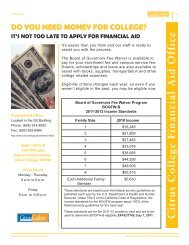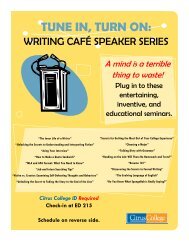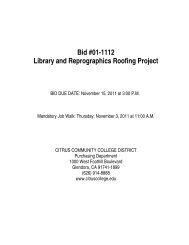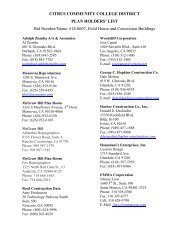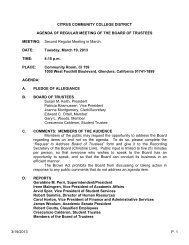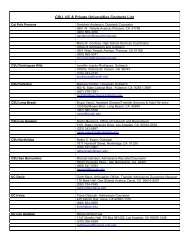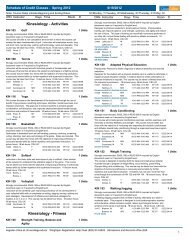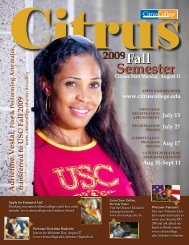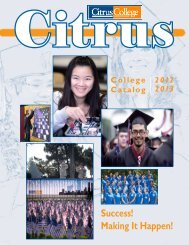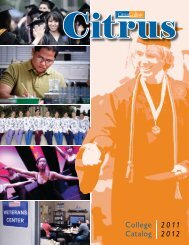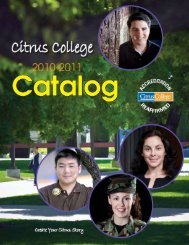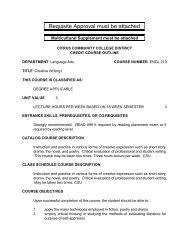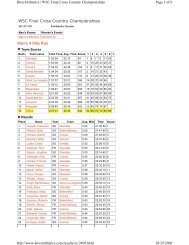Citrus College Catalog 2009-2010 (ver. 10/22
Citrus College Catalog 2009-2010 (ver. 10/22
Citrus College Catalog 2009-2010 (ver. 10/22
You also want an ePaper? Increase the reach of your titles
YUMPU automatically turns print PDFs into web optimized ePapers that Google loves.
Courses in the natural sciences examine the<br />
physical uni<strong>ver</strong>se, its life forms, and its natural<br />
phenomena. They assist in developing an<br />
appreciation and understanding of the scientific<br />
method and encourage an understanding of the<br />
relationships between science and other human<br />
activities.<br />
This category includes introductory or<br />
integrative courses in astronomy, biology,<br />
chemistry, general physical science, geology,<br />
physics, physical geography, physical<br />
anthropology, and other scientific disciplines.<br />
b. Social and Behavioral Sciences: Two<br />
courses, six units minimum including one<br />
course from History and Political Science and<br />
one course from Behavioral Science.<br />
Courses in the social and behavioral sciences<br />
focus on people as members of society. They<br />
assist in developing an awareness of the<br />
methods of inquiry used by the social and<br />
behavioral sciences. Critical thinking is<br />
stimulated about the ways people act and have<br />
acted in response to their societies, and<br />
appreciation is developed of how societies and<br />
social groups operate.<br />
This category includes introductory or<br />
integrative survey courses in cultural<br />
anthropology, economics, history, political<br />
science, psychology, sociology, cultural<br />
geography, and related disciplines.<br />
c. Arts and Humanities: Two courses, six units<br />
minimum, one course from two different areas<br />
that include Fine Arts, Foreign Language,<br />
Humanities, Literature and Philosophy.<br />
Courses in the arts and humanities study the<br />
cultural activities and artistic expressions of<br />
human beings. They assist in developing an<br />
awareness of the ways in which people<br />
throughout the ages and in different cultures<br />
have responded to themselves and the world<br />
around them in artistic and cultural creation,<br />
and in developing aesthetic understanding and<br />
an ability to make value judgments. This<br />
category includes introductory or integrative<br />
courses in the arts, foreign languages,<br />
literature, philosophy and religion.<br />
d. Language and Rationality:<br />
• Students following the mathematics<br />
competency requirement using the mathematics<br />
assessment test are required to complete two<br />
courses, six units minimum, including one<br />
course from English Composition and one<br />
course from either Mathematics or<br />
Communication and Analytical Thinking; or<br />
• Students who have not satisfied the<br />
mathematics competency are required to<br />
complete three courses from English<br />
Composition, one Course from Mathematics and<br />
one course from Communication and Analytical<br />
Thinking.<br />
• Courses in language and rationality develop the<br />
principles and applications of language toward<br />
logical thought, clear and precise expression<br />
and critical evaluation of communication in<br />
whate<strong>ver</strong> symbol system the student uses.<br />
GENERAL EDUCATION PHILOSOPHY AND<br />
REQUIREMENTS<br />
The awarding of an associate degree is intended to<br />
represent more than an accumulation of units. It<br />
symbolizes a successful attempt on the part of <strong>Citrus</strong><br />
<strong>College</strong> to lead students through patterns of learning<br />
experiences designed to develop certain capabilities<br />
and insights, such as the ability to:<br />
• Think and communicate clearly and effectively<br />
through oral and written expression;<br />
• Develop logical and convincing arguments, reaching<br />
conclusions that are based on comprehensive<br />
inquiry;<br />
• Adapt and apply technology to facilitate the<br />
acquisition and effective use of information;<br />
• Understand the modes of inquiry of the major<br />
disciplines;<br />
• Enhance the appreciation of the arts;<br />
• Develop a lifestyle that will enhance physical and<br />
mental health, and wellness;<br />
• Appreciate the contributions of different cultures,<br />
eras, and traditions to the human experience;<br />
• Achieve insights gained through experience in<br />
thinking about ethics, integrity, honesty, selfmanagement<br />
and the welfare of others;<br />
• Develop the capacity for self-understanding; and<br />
• Become informed citizens and problem sol<strong>ver</strong>s.<br />
In addition to these accomplishments, the student<br />
shall possess sufficient depth in some field of knowledge<br />
to contribute to lifetime interest.<br />
Central to an associate Degree, General Education is<br />
designed to introduce students to the variety of<br />
means through which people comprehend the<br />
CITRUS COLLEGE CATALOG <strong>2009</strong> • <strong>20<strong>10</strong></strong> www.citruscollege.edu 49



